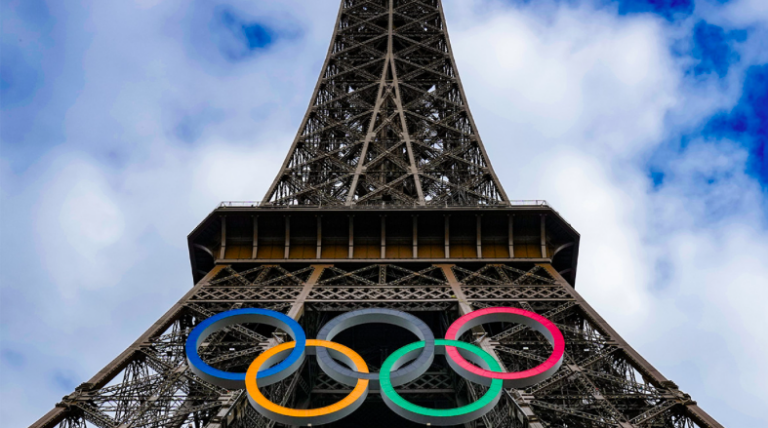Tomorrow, Paris will host the world’s premier sporting event for the first time in a century, welcoming the planet’s most photogenic champions from 206 countries. The aim is to restore the Olympic Games to their former glory after the challenges of Rio and the empty stands of Tokyo, caused by the coronavirus pandemic. Will the €7.5 billion invested be enough to achieve this
On July 26, precisely at 8:30 p.m. (Greece time), the world’s attention will turn to Paris. The opening ceremony, set to unfold not in a stadium but in the heart of Paris, is expected to capture global interest and curiosity. However, it will also heighten concerns about the safety of such a massive, three-hour event in a city that has endured numerous bloody terrorist attacks.
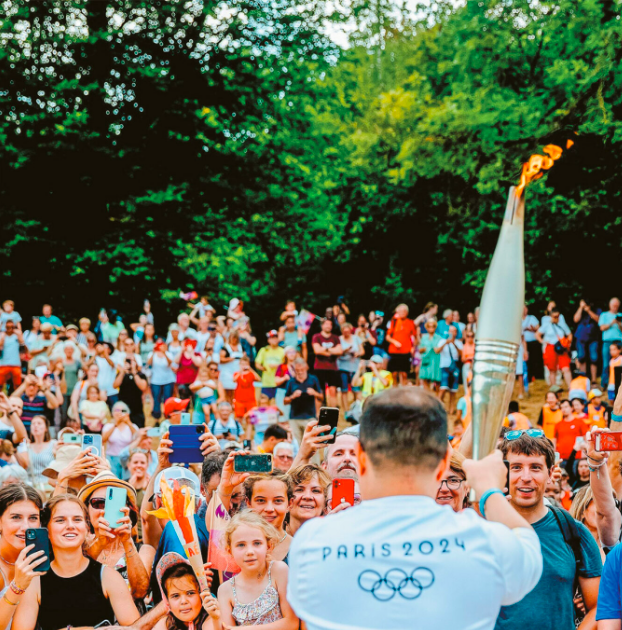
Preparations for the Games, the first since the pandemic and the first to be held in front of a live audience since 2016, will commence two days earlier with football matches including Argentina vs. Morocco and Uzbekistan vs. Spain.
Many believe that the third Olympics hosted by Paris—after 1900 and 1924—has already begun, albeit subtly. They even consider last Wednesday morning as the official start when Parisian Mayor Anne Hidalgo took a symbolic swim in the Seine. The 65-year-old Hidalgo took this plunge to demonstrate that the decade-long, €1.5 billion project to clean up the river has finally succeeded.
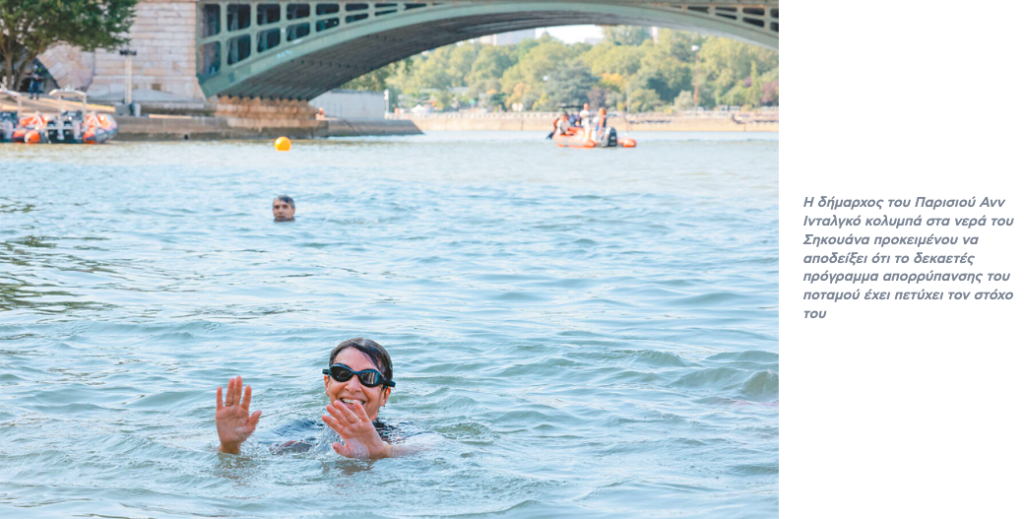
In positive news, Hidalgo emerged from the Seine unharmed, despite previous water tests showing coliform levels ten times above the permissible limit. French Sports Minister Amélie Oudéa-Castéra also swam in the Seine last Saturday, further assuring triathlon and marathon swimming athletes of the river’s suitability and safety for their events. Note that swimming in the Seine for health reasons had been banned since 1923.
The only notable figure yet to take the plunge is President Emmanuel Macron. Since the beginning of his presidency in 2017, Macron has been a staunch supporter of hosting the Games. He even leveraged his influence to secure the French bid over Los Angeles for the 2028 Games. However, Macron is currently preoccupied with other pressing matters and has remained silent about promoting his image of the Games.
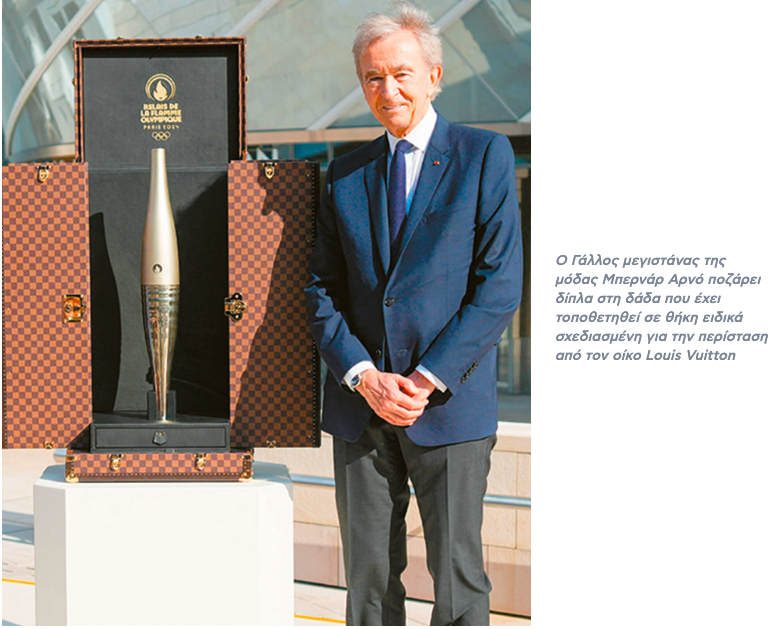
Although Macron was initially captivated by the idea of an opening ceremony set against the Parisian backdrop, he expressed concerns last April about the safety of athletes and the estimated 300,000 spectators. He even suggested the alternative of the Stade de France. Ultimately, the grandeur of the initial plan prevailed. So, for the first time in history, the 10,500 athletes—50% men and 50% women, marking the first Olympics of true gender equality—will parade on floats during the official opening of the Games.
The Opening Ceremony: The Crown Jewel of the Olympics
The opening ceremony is traditionally the crown jewel of the Olympic Games. This is even more true when considering that the French have invested €7.5 billion to bring the world’s premier sporting event back to Paris exactly one century after the city last hosted the Games. To orchestrate this three-hour spectacle, they have entrusted a 42-year-old director known for his proficiency, daring, and modern aesthetic through his acclaimed productions.
Norman-born but Parisian by adoption, Thomas Jolly took on the role of leading the opening ceremony almost unexpectedly. Two years ago, he gave an interview to the newspaper L’Équipe, sharing his grand vision of an opening ceremony outside the confines of traditional stadiums, right where the heart of the city beats. His idea was received with more enthusiasm than he anticipated by the organizing committee, and by September 2022, he was officially appointed.
The only (but major) problem for Jolly is that he will only see his artistic vision come to life in the moment that it is broadcast to the world. The ceremony’s route, spanning approximately 6 kilometers from the Austerlitz Bridge to the Trocadéro—where the Olympic Flame will be lit—makes rehearsals impractical, complicating the preparations further.
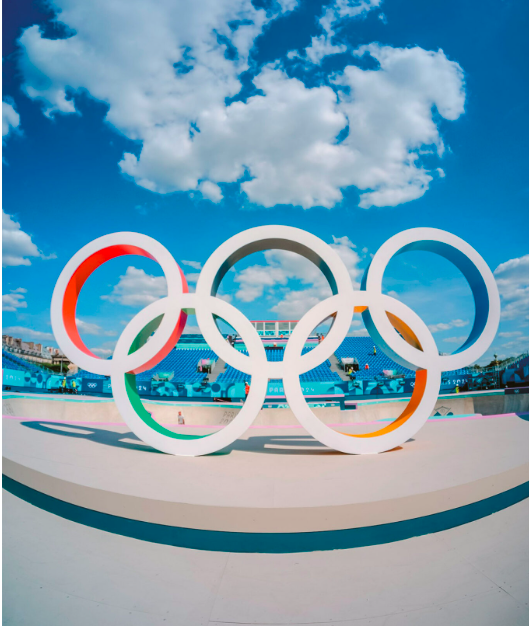
Nevertheless, Jolly promises a show that will blend the classical with the contemporary face of France. He has committed to an inclusive spectacle that reflects the entire country and has decided to utilize all of Paris’s landmarks, which will play a leading role in his artistic conception. He has even self-identified as vaccinated against the impossible—a nod to his ambitious 24-hour Shakespearean production two years ago. His statement certainly raises expectations.
However, let’s be honest: the opening ceremony will not be dominated by Jolly or even by Paris itself. Bernard Arnault, the world’s richest citizen and head of the LVMH empire, has ensured that his brands will steal the show. As he has stated, the artisans of LVMH are perfectionists and detail-oriented in the same way as champions are.
The Arnault Factor
Arnault’s sponsorship of the Paris Games, which will conclude on August 11, is estimated to be around €150 million. This amount reportedly justified Arnault’s influence on the International Olympic Committee to ensure that his group’s trademarks appear during the opening ceremony. The athlete parade will pass by two iconic Louis Vuitton boutiques and the Cheval Blanc hotel, also owned by Arnault. But this will not be the extent of the French giant’s visible presence at the Paris Games.
The medals, which will contain fragments from the Eiffel Tower, are being created by the historic French house Chaumet, part of Arnault’s portfolio. Both the medals and the torches will be transported in specially designed cases by Louis Vuitton. The Arnault family has also designed the official outfits for the French Olympic team, consisting of around 1,300 members, although the job was given to Berluti, an Italian firm under Arnault’s umbrella.
For Arnault’s eldest son and Dior vice-president, Antoine, LVMH could not miss being part of an event that will showcase France to the world. But it’s not just a matter of prestige for the Arnault family, which has close personal ties with President Macron; there are more practical reasons for the 75 luxury brands to make a loud statement.
Once the audience for such expensive products was the ultra-wealthy, but recent American research shows that 60% of consumers are not exceptionally rich. Instead, they are citizens who spend less than €2,000 a year—meaning they are spending from their savings—to add a touch of luxury to their daily lives. Thus, the world’s biggest sporting event, held every four years, seems like an ideal arena for attracting new customers through indirect advertising.
The Venues
The Paris Games will not only be remembered for their opulence—although Arnault’s eldest son rejects this label and insists that the LVMH group tried to think and act creatively—but also for their commitment to gender equality. They aspire to be recognized as the most environmentally neutral Olympics yet.
Whether they achieve this or not, the organizers aimed to use existing venues rather than create new ones that would later be underutilized. For example, in Athens, 20 years after the Games, we still wonder about the fate of venues like the beach volleyball arena at Faliro Bay. The centerpiece of the Paris Olympics will be the Stade de France, where rugby and athletics events will be held from August 2 to 11. Built in 1998 for the FIFA World Cup and with a capacity of 80,000, it has been tested in major sports and concert events and has performed admirably.
Naturally, the French could not overlook the iconic Roland Garros facilities for the Olympic tennis tournament and boxing, as well as the Palace of Versailles, where the modern pentathlon and equestrian events will take place. Another Parisian landmark, the fully renovated Grand Palais, will host fencing and later taekwondo. The Palais de Bercy (now known as Accor Arena) will be the venue for basketball and gymnastics, while the Parc des Princes, home to Paris Saint-Germain, will host football matches.
In the west of the city, La Défense Arena, a hub for the popular French sport of rugby, will host swimming and water polo events thanks to its versatile design. The most photogenic venue, created specifically for the Olympics, will be located in the shadow of the Eiffel Tower. The French had the rather bright idea of placing a 12,800-seat stadium near the city’s most famous landmark for beach volleyball competitions.
The rowing course, Vaires-sur-Marne Nautical Stadium, was built 35 kilometers west of Paris and was completed in 2019. Sailing events will be held in the south of the country at Marseille Marina, while surfers will be particularly fortunate, traveling to Tahiti to ride the waves of the French overseas territory.
The Greek Olympic Team
The Greek Olympic team, which recently numbered 101 members but is now at 100 after the temporary suspension of an athlete who tested positive for doping, will not compete in surfing. However, Greek champions will participate in 15 events. With flag bearers Antigoni Drisbioti and Giannis Antetokounmpo—since 2020, the IOC has allowed countries to have one male and one female flag bearer to promote gender equality—the Greek delegation is the largest since London 2012 and hopes for better results than the modest haul in Tokyo, which included two gold medals for Stefanos Douskos and Miltiadis Tentoglou, a silver for the men’s water polo team, and a bronze for Lefteris Petrounias.
For Rio gold medalist in rings, this will be his third Olympics. Table tennis champion Panagiotis Gionis will double his Olympic appearances in Paris, while Byron Kokkalanis in windsurfing (iqfoil) and Nora Drakou in swimming will each reach their fourth Olympics. Incidentally, the Greek swimming team has 16 members, including Kristian Golomeev, Apostolos Christou, Anna Dountounaki, Alkis Kynigakis (marathon swimming), and Stergios Bilas, and is in excellent form, as shown by their triumphant performances at the recent European Championships in Belgrade, which yielded 20 medals.
Greece will also participate in artistic swimming in the duet event with Evangelia Platanioti and Sofia Malkogeorgou, as well as in water polo (men and women). Greek representation will be seen in cycling (George Bouglas), equestrian (Ioli Mytilinaiou), fencing (Dora Kountoura), judo (Elisavet Teltsidou, Theodoros Tsilidis), wrestling with three entries and many hopes for George Kougioumtidis, tennis (Tsitsipas siblings, Maria Sakkari, and Despina Papamichael), and basketball. The rowing team will be large with seven members, and shooting will have five participants. As for the king of the Olympics, athletics, all eyes will naturally be on Miltiadis Tentoglou (long jump) and his close friend Emmanuel Karalis (pole vault), who is in excellent shape having broken the Greek record twice in a few weeks.
The Criticism
Aside from performance issues, the Olympics are also about impressions for the host cities. Paris seems to be struggling with this, especially after a sharp article by the British newspaper The Telegraph, which was fiercely circulated last week. The columnist argues that the French capital had no real “tourist” reason to host the Olympics, given that it is the most famous and popular city in the world with 44 million visitors annually. Instead, the Games are portrayed as a personal bet, if not obsession, of President Macron, who is reportedly watching disappointing figures unfold daily.
According to the Telegraph journalist, hotel occupancy in Paris is lower than the same period last summer, reaching 81%. He also notes that Air France’s projected losses for the third quarter are due to low interest and reluctance of people to travel to where the heart of the Games will beat.
Economic journalist and analyst Matthew Lynn, who has written about the Greek economic crisis, also notes that Bernard Arnault was recruited by Macron to salvage what can be salvaged. He concludes that the idea of hosting the Olympics every four years in the same part of the world should be seriously considered, suggesting Greece, their birthplace, as an ideal location. But let’s pretend we never read that last part.
Ask me anything
Explore related questions
